- Home
- Robert Jordan
The Gathering Storm twot-12 Page 13
The Gathering Storm twot-12 Read online
Page 13
The concept was so disturbing that she was relieved when Corele interrupted the interrogation a few moments later. The slender, cheerful Murandian was loyal to Cadsuane and had been on duty watching over al'Thor this afternoon. Corele's word that al'Thor would be meeting soon with his Aiel chiefs brought an end to the interrogation, and the three sisters maintaining the shield entered and towed Semirhage off to the room where they would set her bound and gagged with flows of Air.
Cadsuane watched the Forsaken go, carried on weaves of Air, then shook her head. Semirhage had been only the day's opening scene. It was time to deal with the boy.
CHAPTER 6
When Iron Melts
Rodel Ituralde had seen a lot of battlefields. Some things were always the same. Dead men like piles of rags, lying in heaps. Ravens eager to dine. Groans, cries, whimpers and mumbles from those unlucky enough to need a long time to die.
Each battlefield also had its own individual print. You could read a battle like the trail of passing game. Corpses lying in rows that were disturbingly straight indicated a charge of footmen who had been pressed against volleys of arrows. Scattered and trampled bodies were the result of infantry breaking before heavy cavalry. This battle had seen large numbers of Seanchan crushed up against the walls of Darluna, where they had fought with desperation. Hammered against the stone. One section of wall was completely torn away where some damane had tried to escape into the city. Fighting in streets and among homes would have favored the Seanchan. They hadn't made it in time.
Ituralde rode his roan gelding through the mess. Battle was always a mess. The only neat battles were the ones in stories or history books. Those had been cleansed and scoured by the abrasive hands of scholars looking for conciseness. "Aggressor won, fifty-three thousand killed" or "Defender stood, twenty thousand fallen."
What would be written of this battle? It would depend on who was writing. They would neglect to include the blood, pounded into the earth to make mud. The bodies, broken, pierced and mangled. The ground torn in swaths by enraged damane. Perhaps they would remember the numbers; those often seemed important to scribes. Half of Ituralde's hundred thousand, dead. On any other battlefield, fifty thousand casualties would have shamed and angered him. But he'd faced down a force three times his size, and one with damane at that.
He followed the young messenger who had fetched him, a boy of perhaps twelve, wearing a Seanchan uniform of red and green. They passed a fallen standard, hanging from a broken pole with the tip driven into mud. It bore the sign of a sun being crossed by six gulls. Ituralde hated not knowing the houses and names of the men he was fighting, but there was no way to tell with the foreign Seanchan.
The shadows cast by a dying evening sun striped the field. Soon a blanket of darkness would cradle the bodies, and the survivors could pretend for a time that the grassland was a grave for their friends. And for the people their friends had killed. He rounded a small hillock, coming to a scattered pattern of fallen Seanchan elite. Most of these dead wore those insectlike helms. Bent, cracked, or dented. Dead eyes stared blankly from openings behind twisted mandibles.
The Seanchan general was alive, if just barely. His helmet was off, and there was blood on his lips. He leaned against a large, moss-covered boulder, back supported by a bundled cloak, as if he were waiting for a meal to be delivered. Of course, that image was marred by his twisted leg and the broken haft of a spear punching through the front of his stomach.
Ituralde dismounted. Like most of his men, Ituralde wore worker's clothing — simple brown trousers and coat, borrowed off of the man who had taken Ituralde's uniform as part of the trap.
It felt odd to be out of uniform. A man like this General Turan did not deserve a soldier in drab. Ituralde waved the messenger boy to stand back, out of earshot, then approached the Seanchan alone.
"You're him, then," Turan said, looking up at Ituralde, speaking with that slow Seanchan drawl. He was a stout man, far from tall, with a peaked nose. His close-cropped black hair was shaved two finger widths up each side of his head, and his helm lay beside him on the ground, bearing three white plumes. He reached up with an unsteady black-gloved hand and wiped the blood from the corner of his mouth.
"I am," Ituralde said.
"They call you a 'Great Captain' in Tarabon."
"They do."
"It's deserved," Turan said, coughing. "How did you do it? Our scouts. . . ." His cough consumed him.
"Raken," Ituralde said once the cough subsided. He squatted down beside his foe. The sun was still a sliver in the west, lighting the battlefield with a glimmer of golden red light. "Your scouts see from the air, and truth is easy to hide from a distance."
"The army behind us?"
"Women and youths, mostly," Ituralde said. "A fair number of farmers as well. Wearing uniforms taken from my troops here."
"And if we'd turned and attacked?"
"You wouldn't have. Your raken told you that you were outnumbered. Better to chase after the smaller force ahead of you. Better than that to head for the city your scouts say is barely defended, even if it means marching your men near to exhaustion."
Turan coughed again, nodding. "Yes. Yes, but the city was empty. How did you get troops into it?"
"Scouts in the air," Ituralde said, "can't see inside buildings."
"You ordered your troops to hide inside for that long?"
"Yes," Ituralde said. "With a rotation allowing a small number out each day to work the fields."
Turan shook his head in disbelief. "You realize what you have done," he said. There was no threat in his voice. In fact, there was a fair amount of admiration. "High Lady Suroth will never accept this failure. She will have to break you now, if only to save face."
"I know," Ituralde said, standing. "But I can't drive you back by attacking you in your fortresses. I need you to come to me."
"You don't understand the numbers we have ..." Turan said. "What you destroyed today is but a breeze compared to the storm you've raised. Enough of my people escaped today to tell of your tricks. They will not work again."
He was right. The Seanchan learned quickly. Ituralde had been forced to cut short his raids in Tarabon because of the swift Seanchan reaction.
"You know you can't beat us," Turan said softly. "I see it in your eyes, Great Captain."
Ituralde nodded.
"Why, then?" Turan asked.
"Why does a crow fly?" Ituralde asked.
Turan coughed weakly.
Ituralde did know that he could not win his war against the Seanchan. Oddly, each of his victories made him more certain of his eventual failure. The Seanchan were smart, well equipped and well disciplined. More than that, they were persistent.
Turan himself must have known from the moment those gates opened that he was doomed. But he had not surrendered; he had fought until his army broke, scattering in too many directions for Ituralde's exhausted troops to catch. Turan understood. Sometimes, surrender wasn't worth the cost. No man welcomed death, but there were far worse ends for a soldier. Abandoning one's homeland to invaders . . . well, Ituralde couldn't do that. Not even if the fight was impossible to win.
He did what needed to be done, when it needed to be done. And right now, Arad Doman needed to fight. They would lose, but their children would always know that their fathers had resisted. That resistance would be important in a hundred years, when a rebellion came. If one came.
Ituralde stood up, intending to return to his waiting soldiers.
Turan struggled, reaching for his sword. Ituralde hesitated, turning back.
"Will you do it?" Turan asked.
Ituralde nodded, unsheathing his own sword.
"It has been an honor,' Turan said, then closed his eyes. Ituralde's sword — heron-marked — took the man's head a moment later. Turan's own blade bore a heron, barely visible on the gleaming length of blade the Seanchan had managed to pull. It was a pity that the two of them hadn't been able to cross swords — though, in a way, these
past few weeks had been just that, on a different scale.
Ituralde cleaned his sword, then slid it back into its sheath. In a final gesture, he slid Turan's sword out and rammed it into the ground beside the fallen general. Ituralde then remounted and, nodding farewell to the messenger, made his way back across the shadowed field of corpses.
The ravens had begun.
"I've tried encouraging several of the serving men and palace guards," Leane said softly, sitting beside the bars of her cell. "But it's hard." She smiled, glancing at Egwene, who sat on a stool outside the cell. "I don't exactly feel alluring these days."
Egwene's responding smile was wry, and she seemed to understand. Leane wore the same dress that she'd been captured in, and it had not yet been laundered. Every third morning, she removed it and used the morning's bucket of water — after washing herself clean with a damp rag — to clean the dress in her basin. But there was only so much one could do without soap. She'd braided her hair to give it a semblance of neatness, but could do nothing about her ragged nails.
Leane sighed, thinking of those mornings spent standing in the corner of her cell, hidden from sight, wearing nothing while she waited for the dress and shift to dry. Just because she was Domani didn't mean she liked parading about without a scrap on. Proper seduction required skill and subtlety; nudity used neither.
Her cell wasn't bad as cells went — she had a small bed, meals, plenty of water, a chamber pot that was changed daily. But she was never allowed out, and was always guarded by two sisters who kept her shielded. The only one who visited her — save for those trying to pry information from her regarding Traveling — was Egwene.
The Amyrlin sat on her stool, expression thoughtful. And she was Amyrlin. It was impossible to think of her any other way. How could a child so young have learned so quickly? That straight back, that poised expression. Being in control wasn't so much about the power you had, but the power you implied that you had. It was much like dealing with men, actually.
"Have you . . . heard anything?" Leane asked. "About what they plan to do with me?"
Egwene shook her head. Two Yellow sisters sat chatting nearby on the bench, lit by a lamp on the table beside them. Leane hadn't answered any of the questions her captors put to her, and Tower law was very strict about the questioning of fellow sisters. They couldn't harm her, particularly not with the Power. But they could just leave her alone, to rot.
"Thank you for coming to see me these evenings," Leane said, reaching through the lattice of bars to take Egwene's hand. "I believe I owe my sanity to you."
"It is my pleasure," Egwene said, though her eyes showed a hint of the exhaustion she undoubtedly felt. Some of the sisters who visited Leane mentioned the beatings Egwene was suffering as "penances" for her insubordination. Odd, how a novice to be instructed could be beaten but a prisoner to be interrogated could not. And despite the pain, Egwene came to visit Leane in the cell virtually every night.
"I will see you free, Leane," Egwene promised, still holding her hand. "Elaida's tyranny cannot last. I'm confident it won't be long now."
Leane nodded, letting go and standing up. Egwene took hold of the bars and pulled herself to her feet, cringing ever so slightly at the motion. She nodded farewell to Leane, then hesitated, frowning.
"What is it?" Leane asked
Egwene took her hands off of the bars and looked at her palms. They seemed to be coated with a reflective, waxy substance. Frowning, Leane looked at the bars, and was shocked to see Egwene's handprints on the iron.
"What in the Light — " Leane said, poking at one of the bars. It bent beneath her finger like warm wax on the lip of a candle's bowl.
Suddenly, the stones beneath Leane's feet shifted, and she felt herself sinking. She cried out. Globs of melted wax starting to rain down from the ceiling, splattering across her face. They weren't warm, but they were somehow liquid. They had the color of stone!
She gasped, panicked, stumbling and sliding as her feet sank deeper in the too-slick floor. A hand caught hers; she looked up to where Egwene had grabbed her. The bars melted out of the way as Leane watched, the iron drooping to the sides, then liquefying.
"Help!" Egwene screamed at the Yellows outside. "Burn you! Stop staring!"
Leane scrambled for purchase, terrified, trying to pull herself along the bars toward Egwene. She grasped only wax. A lump of bar came loose in her hand, squishing between her fingers, and the floor warped around her, sucking her down.
And then threads of Air seized her, yanking her free. The room lurched as she was tossed forward into Egwene, knocking the younger woman backward. The two Yellows — white-haired Musarin and short Gelarna — had jumped to their feet, and the glow of saidar surrounded them. Musarin called for help, watching the melting cell with wide eyes.
Leane righted herself, scrambling off of Egwene, her dress and legs coated with the strange wax, and stumbled back away from the cell. The floor here in the hallway felt stable. Light, how she wished she could embrace the source herself! But she was too full of forkroot, not to mention the shield.
Egwene climbed to her feet with a hand from Leane. The room fell still, lamp flickering, all of them staring at the cell. The melting had stopped, the bars split, the top halves frozen with drips of steel on their tips, the lower halves bent inward. Many had been flattened to the stones by Leane's escape. The floor inside the room had bowed inward, like a funnel, the rocks stretching. Those stones bore gashes where Leane's scrambling had scored them.
Leane stood, her heart beating, realizing that only seconds had passed. What should they do? Scuttle away in fear? Was the rest of the hallway going to melt, too?
Egwene stepped forward, tapping her toe against one of the bars. It resisted. Leane took a step forward, and her dress crunched, bits of stone — like mortar — falling free. She reached down and brushed at her skirt, and felt rough rock coating it instead of wax.
"These sorts of events are more frequent," Egwene said calmly, glancing at the two Yellows. "The Dark One is getting stronger. The Last Battle approaches. What is your Amyrlin doing about it?"
Musarin glanced at her; the tall, aging Aes Sedai looked deeply disturbed. Leane took Egwene's lead, forcing herself to be calm as she stepped up beside the Amyrlin, chips of stone falling from her dress.
"Yes, well," Musarin said. "You shall return to your rooms, novice. And you . . ." She glanced at Leane, then at the remains of the cell. "We will . . . have to relocate you."
"And get me a new dress as well, I assume," Leane said, folding her arms.
Musarin's eyes flickered at Egwene. "Go. This is no longer your business, child. We will care for the prisoner."
Egwene gritted her teeth, but then she turned to Leane. "Stay strong," she said, and hurried away, heading down the hallway.
Exhausted, disturbed by the stone-warping bubble of evil, Egwene walked with swishing skirts toward the Tower wing that contained the novices' quarters. What would it take to convince the foolish women that there wasn't time to spare for squabbling!
The hour was late, and few women walked the corridors, none of them novices. Egwene passed several servants bustling at late-night duties, their slippered feet falling softly on the floor tiles. These sectors of the Tower were populated enough that lamps burned on the walls, trimmed low, giving an orange light. A hundred different polished tiles reflected the flickering flames, looking like eyes that watched Egwene as she walked.
It was hard to comprehend that this quiet evening had turned into a trap that nearly killed Leane. If even the ground itself could not be trusted, then what could? Egwene shook her head, too tired, too sore, to think of solutions at the moment. She barely noticed when the floor tiles turned from gray to a deep brown. She just continued on, into the Tower wing, counting the doors she passed. Hers was the seventh . . .
She froze, frowning at a pair of Brown sisters: Maenadrin — a Saldaean — and Negaine. The two had been speaking in hushed whispers, and they frowned at Egwen
e as she passed them. Why would they be in the novices' quarters?
But wait. The novices' quarters didn't have brown floor tiles. This section should have had nondescript gray tiles. And the doors in the hallway were spaced far too widely. This didn't look at all like the novices' quarters! Had she been so tired that she'd walked in completely the wrong direction?
She retraced her steps, passing the two Brown sisters again. She found a window and looked out. The rectangular white expanse of the Tower wing extended around her, just as it should. She wasn't lost.
Perplexed, she looked back down the hallway. Maenadrin had folded her arms, regarding Egwene with a set of dark eyes. Negaine, tall and spindly, stalked up to Egwene. "What business have you here this time of night, child?" she demanded. "Did a sister send for you? You should be back in your room for sleep."
Wordlessly, Egwene pointed out the window. Negaine glanced out, frowning. She froze, gasping softly. She looked back in at the hallway, then back out, as if unable to believe where she was.
In minutes, the entire Tower was in a frenzy. Egwene, forgotten, stood at the side of a hallway with a cluster of bleary-eyed novices as sisters argued with one another in tense voices, trying to determine what to do. It appeared that two sections of the Tower had been swapped, and the slumbering Brown sisters had been moved from their sections on the upper levels down into the wing. The novices' rooms — intact — had been placed where the section of Brown sisters had been. Nobody remembered any motion or vibration when the swap happened, and the transfer appeared seamless. A line of floor tiles had been split right down the middle, then melded with tiles from the section that had shifted.
It's getting worse and worse, Egwene thought as the Brown sisters decided — for now — that they would have to accept the switch. They couldn't very well move sisters into rooms the size that novices used.
That would leave the Browns divided, half in the wing, half in their old location — with a clump of novices in the middle of them. A division aptly representative of the less-visible divisions the Ajahs were suffering. Eventually, exhausted, Egwene and the others were sent off to sleep — though now she had to trudge up many flights of stairs before reaching her bed.

 Conan the Unconquered
Conan the Unconquered Conan the Triumphant
Conan the Triumphant The Eye of the World
The Eye of the World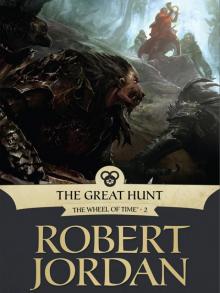 The Great Hunt
The Great Hunt Conan the Victorious
Conan the Victorious The Dragon Reborn
The Dragon Reborn The Fires of Heaven
The Fires of Heaven Winter's Heart
Winter's Heart Lord of Chaos
Lord of Chaos The Shadow Rising
The Shadow Rising Conan the Defender
Conan the Defender The Strike at Shayol Ghul
The Strike at Shayol Ghul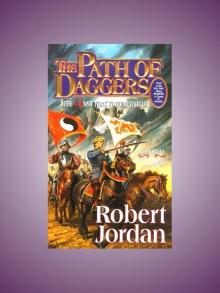 The Path of Daggers
The Path of Daggers A Memory of Light
A Memory of Light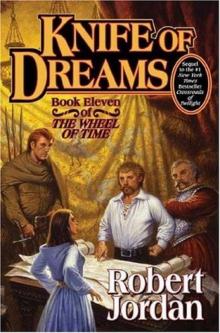 Knife of Dreams
Knife of Dreams Crossroads of Twilight
Crossroads of Twilight Conan the Invincible
Conan the Invincible The Gathering Storm
The Gathering Storm Warrior of the Altaii
Warrior of the Altaii A Crown of Swords
A Crown of Swords The Wheel of Time
The Wheel of Time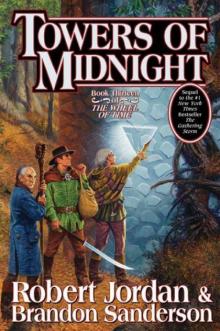 Towers of Midnight
Towers of Midnight Conan Chronicles 2
Conan Chronicles 2 Conan the Magnificent
Conan the Magnificent New Spring
New Spring What the Storm Means
What the Storm Means A Memory of Light twot-14
A Memory of Light twot-14 New Spring: The Novel
New Spring: The Novel Towers of midnight wot-13
Towers of midnight wot-13 A Memory Of Light: Wheel of Time Book 14
A Memory Of Light: Wheel of Time Book 14 A Crown of Swords twot-7
A Crown of Swords twot-7 Lord of Chaos twot-6
Lord of Chaos twot-6 The Great Hunt twot-2
The Great Hunt twot-2 The Shadow Rising twot-4
The Shadow Rising twot-4![Wheel of Time-11] Knife of Dreams Read online](http://i1.bookreadfree.com/i1/04/03/wheel_of_time-11_knife_of_dreams_preview.jpg) Wheel of Time-11] Knife of Dreams
Wheel of Time-11] Knife of Dreams The Dragon Reborn twot-3
The Dragon Reborn twot-3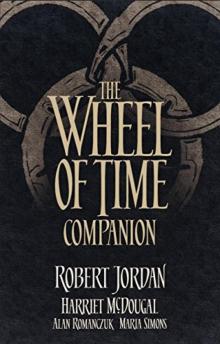 The Wheel of Time Companion
The Wheel of Time Companion The Fires of Heaven twot-5
The Fires of Heaven twot-5 Prologue to Towers of Midnight
Prologue to Towers of Midnight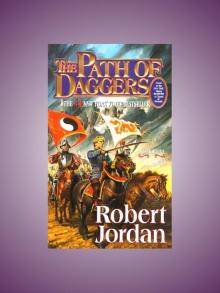 The Path of Daggers - The Wheel of Time Book 8
The Path of Daggers - The Wheel of Time Book 8 The Path of Daggers twot-8
The Path of Daggers twot-8 By Grace and Banners Fallen: Prologue to a Memory of Light
By Grace and Banners Fallen: Prologue to a Memory of Light Crossroads of Twilight twot-10
Crossroads of Twilight twot-10 The Gathering Storm twot-12
The Gathering Storm twot-12 Winter's Heart twot-9
Winter's Heart twot-9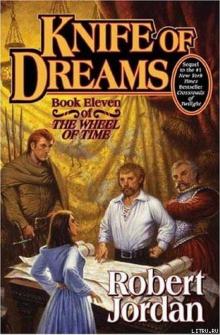 Knife of Dreams twot-11
Knife of Dreams twot-11 New Spring: The Novel (wheel of time)
New Spring: The Novel (wheel of time)